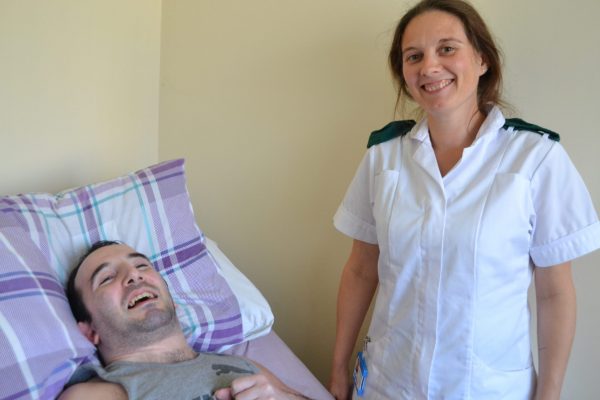For patients with long term neurological conditions a co-ordinated approach to their care and support involving a number of therapists is key to helping them lead independent lives wherever possible.
Walsall Healthcare’s Community Neurological Rehabilitation Team, based at Short Heath Clinic in Willenhall, sees patients both in the clinic setting and in their own homes and has a particular focus on Multiple Sclerosis and Parkinson’s Disease.
Karen Paton, Specialist Occupational Therapist, said: “Our co-ordinated care is delivered through a well-established Multi-Disciplinary Team structure which includes a Rehabilitation Consultant, Clinical Nurse Specialists, Physiotherapists, Occupational Therapists, Psychologists, Speech and Language Therapists and Assistant Practitioners.
“Neurological conditions can be life changing for patients and can include a range of symptoms such as partial or complete paralysis, muscle weakness, partial or complete loss of sensation, seizures, pain and poor cognitive abilities.
“There are a number of factors to be taken into consideration when developing the most appropriate care and support programme and these can include the patient’s home environment and their accessibility to their local community. This can be illustrated by one of our patients George who has Multiple Sclerosis.
“He was seen at home by the MS Nurse Specialist and the Rehabilitation Consultant as he was unable to access the MS clinic due to his mobility. At his appointment, several issues were identified including a significant deterioration in his symptoms. This wasn’t only impacting his quality of life but also that of his mother who is his carer.
“Through links with the Rehabilitation Consultant, George was referred to West Park for a period of inpatient rehabilitation. Following this he was discharged back home with the support of our team. The Physiotherapist and Occupational Therapist set up an on-going rehabilitation programme at home to include a daily regime of sitting out that required co-ordination of services as, initially; he had no appropriate seating.
“The Occupational Therapist ordered a specialist supportive chair and referred George to Walsall Wheelchair Service for a tilt in space wheelchair. George also needed support from the MS Nurse Specialist and psychologist around his MS medication.
“We were also able to make a referral to ACT (Access to Communication and Technology) to help improve his independence at home and enable him to use an iPad. Specialist hand splints were also made for him.”
Karen added that the team also worked with George’s housing agency as he was living at that time in a second floor flat without lift access. He has since moved to more suitable accommodation.
“We are dedicated to providing high quality care for patients with long-term neurological conditions so they can lead more independent and fulfilled lives.”
George, who is 36, explained that he was diagnosed with MS in 2006.
“I can’t do anything for myself and am dependent on others,” he said. “I have been working with the team on my physio and using the tilt tables at the Goscote Centre. As I am bed bound I like the feeling of the blood rushing through my legs when I’m on the tilt table.
“Through the co-ordination of Occupational Therapists with District Nurses I now have a bed that can elevate so I can eat better and sit up. They sorted out equipment for me. I also like going out in my wheelchair – although mum isn’t so keen as she has to push it and there aren’t always dropped kerbs!
“I listen to Talk Radio and enjoy business podcasts; I’ve found out a lot of things I didn’t know before by listening to those.”

